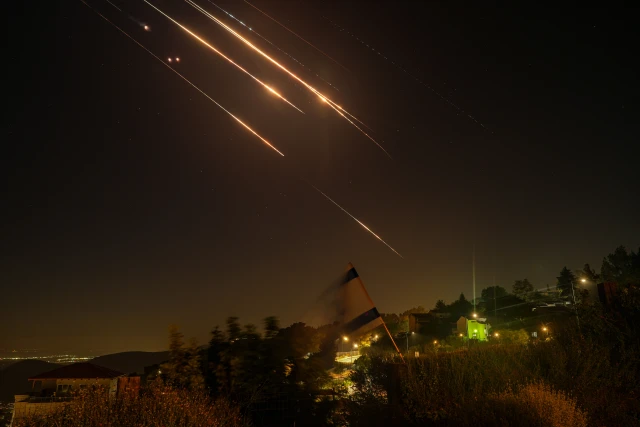Overnight strikes end without injuries, Iran shoots smaller barrages as Israel continues hunt for launchers
IRGC claims use of hypersonic missiles against Israel, says it achieved 'complete control' of Israeli skies

Iran launched two barrages of ballistic missiles at Israel overnight as the war between Israel and Iran enters its sixth day.
The first barrage came at about 12:40 a.m., when Iran launched approximately 15 ballistic missiles at Israel. Less than an hour later, Iran launched another salvo, containing roughly 10 missiles, triggering additional alerts in central Israel.
Taking a page from Israel’s playbook, Iran’s Islamic Revolutionary Guard Corps (IRGC) published an evacuation order for part of Tel Aviv ahead of the strikes. While a spokesman for the Iranian missile operation against Israel – referred to by the regime as Operation True Promise 3 – claimed that Iran had achieved “complete control over the skies of the occupied territories.”
The IRGC also claimed to have used its Fatteh-1 hypersonic missiles in the attacks on Israel.
🚨For the 2nd time in less than an hour, families across Israel are running for shelter as sirens sound due to a missile launch from Iran🚨 https://t.co/jWANsaUA0x
— Israel Defense Forces (@IDF) June 17, 2025
This marks the first time the IRGC has officially claimed the use of the missile – unveiled just two years ago – in the current conflict.
Although several impacts were recorded following the barrages, no injuries were reported. One fire broke out in a parking lot after shrapnel ignited multiple vehicles, and additional fires sparked by falling debris were reported in northern and central Israel.
However, Magen David Adom emergency services confirmed that no casualties or injuries occurred in the attacks.
The two salvos launched overnight followed smaller barrages on Tuesday as the Israeli Air Force (IAF) continues to identify and target ballistic missile launchers in Iran.
Shortly after the ballistic missile launches, sirens were activated in the Jordan River Valley near Ein Gedi and the Dead Sea due to a suspected drone infiltration. The IDF later said that it had intercepted two drones from Iran.
Another wave of drones triggered sirens shortly before 6 a.m. in northern Israel, followed by the IDF reporting that it had downed additional drones approaching from the east.
The reduction in the number of ballistic missiles per launch has raised questions about Iran’s ability to sustain large volleys. On Tuesday, the IDF said that it had destroyed approximately one-third of Iran’s ballistic missile launchers and released videos of those strikes on various launchers as evidence.
The IAF strikes early on Wednesday morning are an example of this. The IDF announced that over 50 Israeli fighter jets completed a wave of strikes on military targets in the area of Tehran.
⭕️ The IDF struck a centrifuge production site and multiple weapon manufacturing facilities in the Tehran area, key elements of Iran’s nuclear weapons and missile programs.
— Israel Defense Forces (@IDF) June 18, 2025
Over 50 IAF fighter jets targeted:
- A facility for producing centrifuges used to enrich uranium beyond… pic.twitter.com/YXMiKAJWVz
Alongside nuclear sites, the IAF also struck launchers and “sites manufacturing parts for surface-to-surface missiles fired at Israel.”
Iran was believed to possess just over 2,000 ballistic missiles prior to the launch of "Operation Rising Lion," with the military reporting that approximately 400 of those missiles have been fired at Israel since last Friday.
In light of the loss of multiple launchers and Israel’s established air superiority, the Iranian regime may be attempting to preserve its remaining missile launchers and stockpiles.
In addition, IDF Spokesman Brig.-Gen. Effie Defrin said on Tuesday that Iran is withdrawing its missile array east toward central Iran to avoid the IDF's airstrikes, which also increases the distance to Israel, making it harder to launch large barrages.
Israel’s decision to shift the focus of its airstrikes to Iran’s ballistic missile production facilities, in addition to its launchers, underscores the seriousness with which it views the threat posed by Iran’s missile capabilities.
As in previous attacks, the IDF issued warnings in Farsi to the residents of Tehran before launching the strikes, urging them to evacuate the targeted areas.
"Dear citizens, for your safety and health, we ask that you immediately leave the designated area in District 18 of Tehran," the IDF Farsi spokesperson wrote on social media.

The All Israel News Staff is a team of journalists in Israel.
You might also like to read this:








